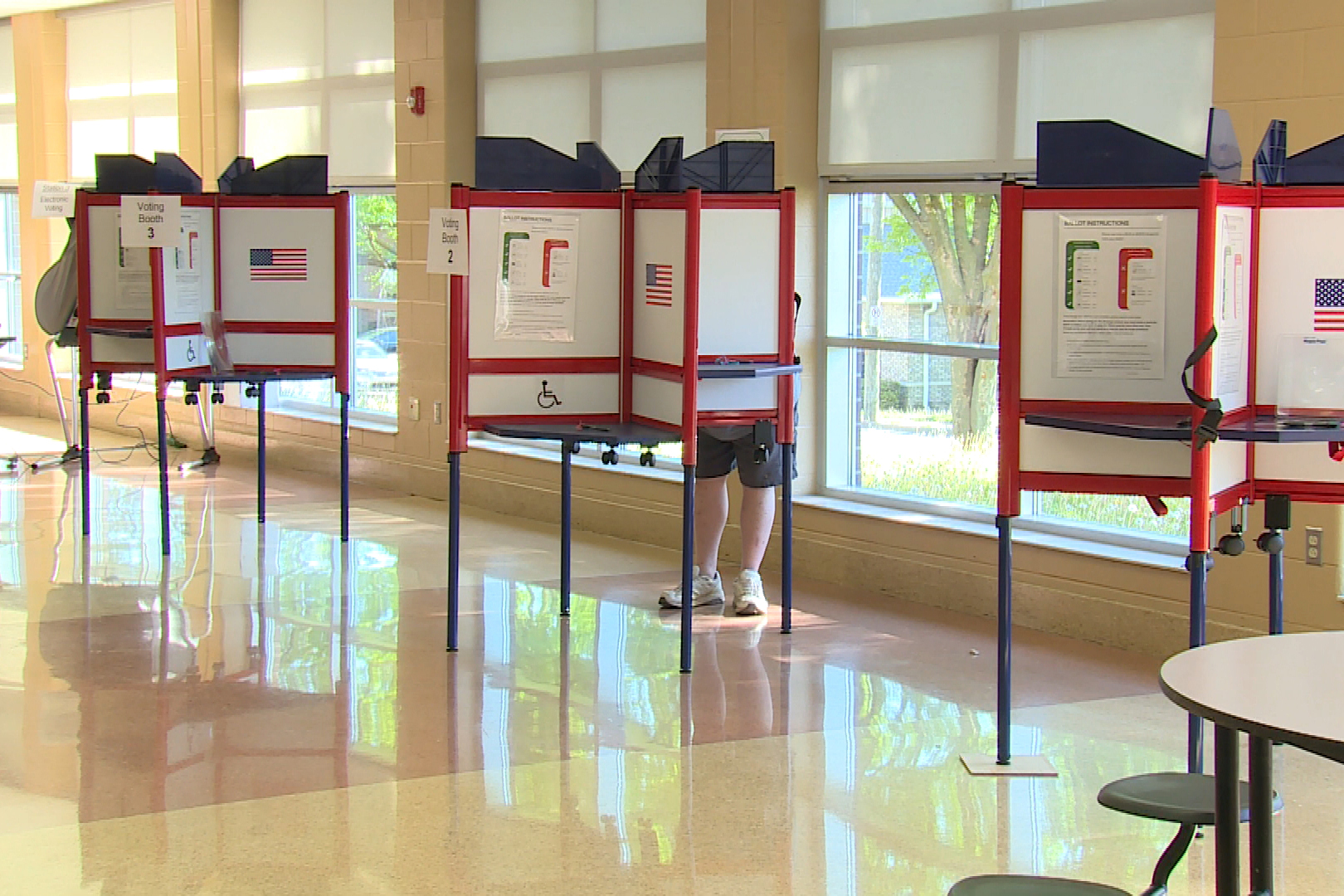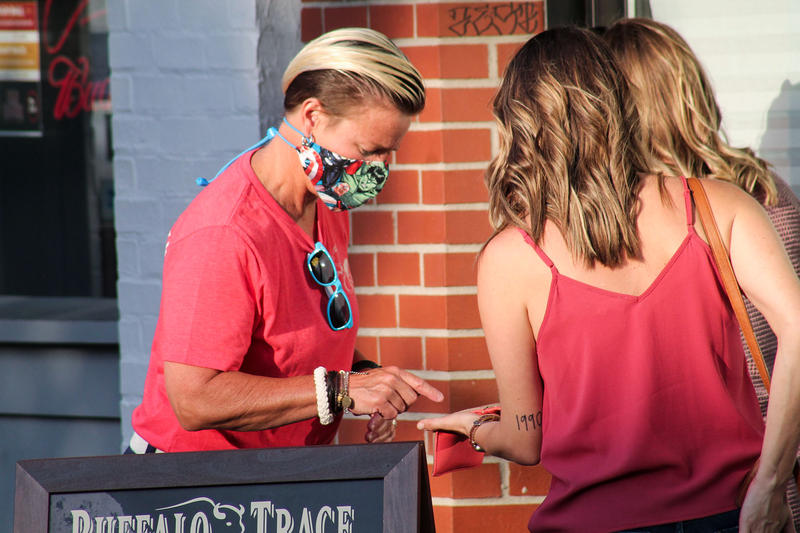
Voting booths in Monroe County.
How has Indiana changed the November election in response to the COVID-19 pandemic?
After expanding absentee by mail ballots for the June primary, Indiana Republicans – including Secretary of State Connie Lawson – rejected the same for the November election. Gov. Eric Holcomb said he would only push for it if Indiana were once again under a “Stay-At-Home” order.
Indiana is among the one-third of states that require a reason for vote-by-mail. But in light of the pandemic, the state is encouraging Hoosiers to vote by mail if they’re eligible and working to make it easier to do so. Before the pandemic, outside of a few counties that allowed fax or email requests for vote-by-mail ballots, voters had to mail a request to the election board. For 2020, the state has built an online request system through the Secretary of State’s website.
Who is eligible to vote in Indiana?
There are a few qualifications to vote in Indiana. First and foremost, you must be both a U.S. citizen and a resident of Indiana. Additionally, you must be 18 years old on or before Election Day – which means 17-year-olds can vote in primaries as long as they’re 18 before Nov. 3, 2020.
People who are currently in prison after being convicted of a crime cannot vote in Indiana. But their voting rights are restored upon release. And you have to have lived in the precinct you’re voting in for at least 30 days before the election.
Finally, you have to be registered to vote.
How do you register to vote?
The easiest way: go to IndianaVoters.com. The Indiana Secretary of State runs the site, and allows you to register to vote, update address information, check your registration and find your polling place on this website.
But you also must have a valid Indiana Driver’s License or Indiana State Identification Card.
You can register to vote in-person or by mail by filling out a voter registration form. Indiana residents can register to vote without a driver’s license or Indiana State Identification Card – but, because of Indiana’s voter ID laws, you’ll have to have a legal identification card issued by the U.S. government or the state of Indiana on Election Day.
Certain military and overseas voters have extended registration deadlines. All that information is available on the Indiana Secretary of State’s website.
How do I request a ballot to vote by mail?
Once you’ve registered to vote, you may request an absentee-by-mail ballot from your county election board. The Indiana Secretary of State’s office has developed an online portal to request a ballot.
To do so, after you have registered to vote, go to IndianaVoters.com:
- Select “Visit My Voter Portal”
- Fill out the details on the pop up box (first and last name, data of birth, and county)
- Once you’re in your voter portal, at the top of the page, there is a section that says “Want to apply for an Absentee Ballot?”
- Select the blue button that says “VOTE BY MAIL”
- Then fill out the form
- INFORMATION OF ABSENTEE BALLOT APPLICANT
- Fill out the form – you should just need to provide the last four digits of your Social Security Number.
- Confirm your current address
- Confirm if your name has changed
- ABSENTEE BALLOT MAILING ADDRESS
- Confirm if your mailing address is the same as the address you’re registered to. If it’s not, you’ll be asked to fill out that address.
- REASON TO VOTE ABSENTEE BALLOT BY MAIL
- If one applies, select one of the 11 reasons Indiana allows you to vote by mail. If none of them apply to you, then you are not able to request an absentee ballot by mail. Secretary of State Lawson said fears over COVID-19 for those in high-risk populations might fall under a provision for Hoosiers confined to their home due to illness or injury.
Indiana is among the one-third of states that require a reason for voting absentee-by-mail – one of the following must apply:
- You have a specific, reasonable expectation that you will be absent from the county on Election Day during the entire 12 hours that the polls are open (6 am until 6 pm).
- You have a disability.
- You are at least 65 years of age.
- You will have official election duties outside of your voting precinct.
- You are scheduled to work at your regular place of employment during the entire 12 hours that the polls are open.
- You will be confined due to illness or injury or you will be caring for an individual confined due to illness or injury during the entire 12 hours that the polls are open.
- You are prevented from voting because of a religious discipline or religious holiday during the entire 12 hours that the polls are open.
- You are a participant in the state's address confidentiality program.
- You are a member of the military or a public safety officer.
- You are a "serious sex offender" as defined in Indiana Code 35-42-4-14(a).
- You are prevented from voting due to the unavailability of transportation to the polls.
Absentee-by-mail voters are not required to show photo identification. County boards must receive absentee-by-mail applications by Oct. 22, 2020 at 11:59 p.m. – and the application can be mailed, emailed, or hand delivered to county election boards.
Now, how do I vote by mail?
After requesting your absentee-by-mail ballot, you must fill it out and mail it to the county election board’s office.
But also keep in mind: ballots are only valid if they are received by the election board before noon on Nov. 3 – so leave plenty of time for mail to get to your county election board.
How do I track my ballot?
On your Voter Portal at IndianaVoters.com, you’re able to track things like the date the clerk’s office received your application for the absentee ballot, the date your ballot was mailed to you, and the date the clerk’s office received it.
That information will be on the homepage of your voter portal under “Absentee Ballot Information.”
Can I vote in person?
Yes. But it’s not really encouraged for voters who may be at higher risk for COVID-19. Voters are able to vote at their county election office starting 28 days before an election. Some counties are offering more early voting sites ahead of the November election.
If you plan to vote on Election Day, be sure to double check your polling place. You can do that on IndianaVoters.com under your Voter Portal. At the very top of the page, it lists the locations you’re able to vote on Election Day. A few counties in Indiana have vote centers, where any county resident is able to vote, no matter their address.
On Election Day, polls are open from 6 a.m. to 6 p.m. local time.
What do I need on Election Day?
You need a photo ID.
Under Indiana’s 2005 voter ID law, your photo identification must meet four criteria: it must display your photo, your name (though, it doesn’t have to be a perfect match), an expiration date and either be current or have expired sometime after the date of the last General Election, and issued by the state of Indiana or the U.S. government.
There are a handful of photo IDs that fall into those categories. An Indiana driver’s license, a U.S. passport, Indiana State Identification Card, or military ID card all work. And student IDs at Indiana state colleges and universities may also work – as long as they follow the rest of the criteria. However, students at private institutions may not use student IDs for voting.
What if I’m unable to present an ID card on primary or Election Day?
If your identification card doesn’t meet the criteria, you can cast a provisional ballot for the election. You have until noon, 10 days after the election to present a valid form of identification.
How do I get an Indiana State Identification Card if I don’t have a driver’s license?
Indiana’s 2005 voter ID law also included the requirement that Indiana Bureau of Motor Vehicles provide free identification cards. To obtain that card, you have to provide original copies or certified versions of documents to prove your Social Security number, identity, lawful status in the U.S., and two documents proving your Indiana residency.
How do I prepare to vote?
Go to IndianaVoters.com and select “Check my registration.” Once you log into your Voter Portal, scroll to “Who's on the Ballot.”
We’ve compiled a tip sheet for finding more information about the candidates on your ballot to make informed decisions when voting.
What rights do I have as a voter?
Short answer: a lot. If you meet the criteria for voting in Indiana, you have the right to fair and free elections.
The Indiana Secretary of State has a one-page document in English and Spanish for who to call if you’re concerned about your voting place. If you feel your rights have been violated or you’re concerned about voter fraud there are a few resources you can contact.
Indiana Secretary of State’s Office
(866)-IN-1-VOTE (866-461-8683)
They’ll have staff on hand for phone calls from 6 a.m. to 7 p.m. Eastern.
Indiana Disability Rights
Voice (317) 722-5555
Toll Free (800) 622-4845
Text Telephone (TTY) (800) 838-1131
Indiana Election Division
Direct (317) 232-3939
Toll Free (800) 622-4941
How do I make sure my voting place is accessible?
The Help America Vote Act of 2002 requires each polling place to have at least one accessible voting machine, in addition to making the facility accessible.
Voters with physical disabilities may seek assistance from poll workers (one from each political party). You’re also able to designate a friend or relative to assist you during voting – but they must complete an Affidavit of Voter Assistance at the Polls. That’s available at the polling station, before entering the voting booth.
If there is an issue with accessibility at your polling place, you can call the Indiana Secretary of State’s office and file an accessibility grievance form.
Can someone vote if they are housing insecure?
Short answer: yes.
People who have a non-traditional residence, like those who are homeless, or those who live in a motor home, must still provide a location sufficient to allow local election officials to place the person in a precinct. If you stay in more than one place, voter registration officials should ask you to designate the location where you usually sleep in the county.
Your best chance of registering to vote will be working with your county election board. If the place has no street address, you’ll be asked to indicate the location by drawing a map or writing a description of the location on the state’s voter registration form or federal mail-in registration form in the appropriate box.
You’ll also be asked to provide a mailing address within the county where you reside – that being said, P.O. boxes cannot establish residency.
For online voter registration, you’ll be asked to provide an intersection for your address, which county officials will use to determine your precinct.
Contact Lauren at lchapman@wfyi.org or follow her on Twitter at @laurenechapman_.










